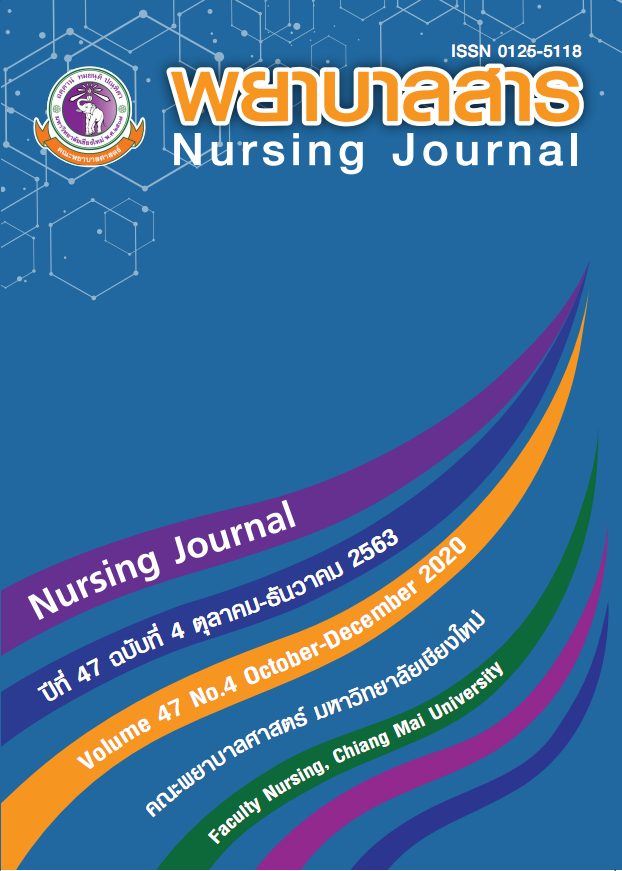Effect of the Empowerment Program on Muscle Exercise Practicing for Physical Disability Person Among the Village Health Volunteers
Keywords:
Empowerment, Muscle exercise practicing, Physical disability person, Village health volunteersAbstract
Physical disability person had health problems from complications such as muscle atrophy and join stiffness. It is very important and necessary to prevent these complications. Village health volunteers is a helper and health personal whom is near physical disability person and family in community. Therefore, village health volunteers should be developed ability in properly muscle exercise practicing for physical disability person.
This quasi-experimental research aimed to study the effect of the empowerment program on muscle exercise practicing for physical disability person implemented by village health volunteers. Twenty-three participants were selected through purposive sampling technique from village health volunteers who were trained in a 70-hour course on providing care for older people organized by the Ministry of Public Health, works and provides services for physical disability person in Saraphi district, Chiang Mai province. The research instruments were consisted of 1) Empowerment program 2) Guide book on muscle exercise practicing and 3) Evaluation form on muscle exercise practicing which developed by researcher and tested for content validity indexes 0.83. The reliability of the instrument is based on the feasibility test of Richardson 21(KR-21) were 0.93. The statistical analysis of the frequency distribution, percentage, mean and the Wilcoxon signed-rank were used for data analysis.
The research findings revealed that:
The mean score of muscle exercise practicing for physical disability person was significantly higher after program participation (p < 0.001). There was a rise in the mean score on muscle exercise practicing before the program (=23.26, S.D.=3.22) and after the program (=44.47, S.D.=4.66). The results showed that research findings can be used as a guideline to promote community nurses and health care teams to reinforce the empowerment among village health volunteers to promote muscle exercise practice with effectiveness and efficiency for physical disability person. Suggestions for further research should be study on the outcomes for physical disability person such as degree of joint in motion, muscle strength, in order to promote the provision of quality health care services for physical disabilty person in community.
References
Buapum, P., Maneerod S., & Rodporm, P. (2014). Curriculum development for the village health volunteers (VHVs) to enhancing capabilities for home-based care empowerment on the elder people who have chronic diseases. KKU Journal for Public Health Research, 7(3), 60-67. (In Thai)
Chungsathiansap, K., Phonphakhakun, S., & Katha, P. (2015). Khon thamngan bandanchai. Nonthaburi: Society and Health Institute. (In Thai)
Department of Empowerment of Persons with Disabilities. (2018). Statistics of disabled persons in Thailand. Retrieved from https://www.m-society.go.th/download/article/article_20180703100206.pdf. (In Thai)
Ellis-Stoll, C., & Popkess-Vawter, S. (1998). A concept analysis on the process of empowerment. Journal of Advanced Nursing, 21(2), 62-68.
Gibson, C. H. (1993). A study of empowerment in mother of chronically ill children (Doctoral dissertation, Boston college, Boston).
Gibson, C. H. (1993). The process of empowerment in mothers of chronically ill children. Journal of Advanced Nursing, 21(6), 1201-1210.
Halar, E. M., & Bell, K. R. (1998). Immobility: physiological and functional change and effects of inactivity on body functions. In J. A. Delisa (Ed.), Rehabilitation medicine: principles and practice (3rd ed., pp. 1015-1034). Philadelphia, NY: Lippincott- Raven.
Jaemtim, N., Yuenyong, S., & Srisodsaluk, P. (2016). Effect of the empowerment program on the prevention of hypertension disease in the population at risk of hypertension disease of Tombon Chokchram, Umphor Bangplama, Suphanburi province. The Journal of Baromarajonani College of Nusing, Nakhonratchasima, 22(1), 65-76. (In Thai)
Jampasri, P., Rattanagreethakul, S., & Lawang, W. (2017). Factors influencing rehabilitation practice for persons with physical disability among village health volunteers in Nakhon Pathom province. The Journal of Faculty of Nursing Burapha University, 25(3), 76-88. (In Thai)
Kaihin, R., Kasatpiba, N., & Chitreechue, J. (2012). Effects of empowerment on reduction risk behaviors among youth living with HIV/AIDS. Nursing Journal, 39(3), 38-50. (In Thai)
Kraus, L., Lauer, E., Coleman, R., & Houtenville, A. (2018). 2017 Disability statistics annual report. Durham: University of New Hampshire.
Mukpradab, S., Songwathana, P., & Seasia. (2014) Outcome-oriented movement-supporting programme and its musculoskeletal outcomes as observed in trauma patients suffering from immobilization: A pilot study. Thai Journal of Nursing Council, 29(2), 49-60. (In Thai)
Noh, J. W., Kwon, Y. D., Park, J., Oh, I. H., & Kim, J. (2016). Relationship between physical disability and depression by gender: A panel regression model. PLoS One, 11(11), 1-9. doi:10.1371/journal.pone.0166238
NongThong, T. (2017). Assistance to persons with physical disabilities. Retrieved from http://www.snmri.go.th/snmri/download/train/ud/ud1_60.pdf. (In Thai)
Pengsa-ium, V., Chaiyasung, P., & Yakasem, P. (2015). Outcome of empowerment program on perceived empowerment and caregiving practice of health volunteers to dementia of elderly. Journal of Nursing and Education, 8(1), 152-165. (In Thai)
Poomsanguan, K. (2014). Health and health promotion: Nurses’ important role. Journal of The Royal Thai Army Nurses, 15(3), 86-90. (In Thai)
Sawaidee, P., Toonsiri, C., & Homsin, P. (2016). Factors related to self-care ability among people with mobility impairment in Banglamung District, Chon Buri Province. The Journal of Faculty of Nursing Burapha University, 24(1), 89-104. (In Thai)
Srikramkran, R. (2009). Teaching techniques. Bangkok: Ramkhamhaeng Publisher. (In Thai)
Srisompat, J. (2014). Public health village volunteers' roles in performing their work for Tambon Kham Hai public health promotion hospital, Phanom Phrai district, Roi Et province (1st ed.). Nakhon pratom: Mahamakut Buddhist University. (In Thai)
Tachapun, T. (2018). Effect of empowerment program of the village health volunteers to implementation of community health education in Papai Municipality, Sansai District, Chiang Mai Province (Master’s thesis, Chiangmai Rajabhat University). (In Thai)
Tawatwattananun, A. (2010). Self-empowerment guideline on elderly caregiving of village health volunteers: Samutsakhon Province. Bangkok: Thammasat University. (In Thai)
Downloads
Published
How to Cite
Issue
Section
License
บทความที่ได้รับการตีพิมพ์เป็นลิขสิทธิ์ของวารสารพยาบาลสาร
ข้อความที่ปรากฏในบทความแต่ละเรื่องในวารสารวิชาการเล่มนี้เป็นความคิดเห็นส่วนตัวของผู้เขียนแต่ละท่านไม่เกี่ยวข้องกับมหาวิทยาลัยเชียงใหม่ และคณาจารย์ท่านอื่นๆในมหาวิทยาลัยฯ แต่อย่างใด ความรับผิดชอบองค์ประกอบทั้งหมดของบทความแต่ละเรื่องเป็นของผู้เขียนแต่ละท่าน หากมีความผิดพลาดใด ๆ ผู้เขียนแต่ละท่านจะรับผิดชอบบทความของตนเองแต่ผู้เดียว






